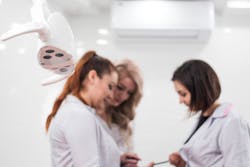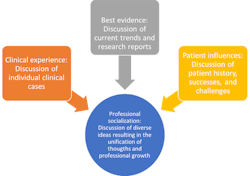Professional socialization: What it is and why you need it
Although professional socialization (i.e., the internalization and development of a professional identity) is important when advancing the profession, it can be equally important in improving patient outcomes. Theoretically, the improvement of patient outcomes would be based on the provision of evidenced-base care. And when you delve into the fundamentals of evidence-based care, which include sound evidence; the influence of a patient’s history, needs and demands; and a clinician’s past experiences, this coincides quite naturally with the act of professional socialization.
As a hygienist reflects upon the cases of the day, sometimes he or she feel accomplished because a patient returned with healthy gingiva, and or maybe frustrated because a patient is still not brushing daily. Perhaps there is a case that seems to leaves the dental hygienist questioning why the outcome has not improved, such as an undiagnosed health issue or maybe a nonreported dietary change.
During both, the times of positive outcomes and the times when questions linger, the hygienist should reach out to another hygienists to discuss. Fellow colleagues can recommend a new product or treatment regimen, which the dental hygienist can then research for effectiveness, or the colleague can share his or her own clinical experiences with successful and not successful outcomes. Additionally, dental hygienists can share ways they have been able to improve patient involvement or compliance. By sharing patient success stories, other dental hygienists can learn about ways to help improve patient outcomes.
According to the American Dental Hygienists’ Association (ADHA), dental hygienists must develop professional socialization skills and there must be greater networking among dental hygienists.1 Faculty within dental hygiene programs discuss professional topics, including clinical cases, on a daily basis, bringing perspectives from different schools and practice philosophies, enabling them to learn from each other.
Physicians working together in settings such as hospitals or medical clinics are frequently depicted in television programs and movies discussing clinical cases, specifically discussing ways to find a solution to improve a patient outcome. Learning from a clinician’s past experience is often referred to as the hidden curriculum—when providers learn from each other, as opposed to learning from textbooks, periodicals or lectures. Sometimes this is what the entire plot is built upon. With that being said, professional socialization can help improve patient outcomes, because individuals working together, utilizing their past experiences and knowledge, have been able to accomplish quite a bit when developing solutions.
Since dental hygienists often times work in practices that do not also employ other dental hygienists, or at least on the same days, it is up to us to reach out to begin these discussions. In order to take dental hygiene practice one step forward, it is up to dental hygienists to learn from each other, even after graduation. Professional socialization is the perfect vehicle for this unified learning. Ultimately, it leads to better clinical skills and improves patient outcomes.
Reference
- American Dental Hygienists’ Association. Dental Hygiene: Focus on Advancing the Profession. http://wsdha.com/clientuploads/pdfs/ADHA%20pdf/ADHA_Focus_on_Advancing_Profession.pdf. Published June 2005.
Christine Nathe, RDH, MS, is director at the University of New Mexico division of dental hygiene, in Albuquerque, New Mexico. She is also the author of Dental Public Health Research, which is in its fourth edition with Pearson. She can be reached at [email protected] or (505) 272-8147.
About the Author
Christine Nathe, MS, RDH
Christine Nathe, RDH, MS, is director at the University of New Mexico division of dental hygiene, in Albuquerque, New Mexico. She is also the author of Dental Public Health Research, which is in its fourth edition with Pearson. She can be reached at [email protected] or (505) 272-8147.

